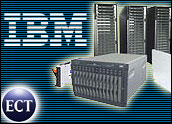
IBM this week revealed five new, higher-end, Opteron-based server systems for increased energy efficiency. The releases further highlight the company’s commitment to Advanced Micro Devices’ server processor products.
IBM said its AMD-based server expansion, to include x86 blade servers with new IBM technology, will bolster its arsenal of x86 servers and blades, where IBM leads the server market.
The company’s strategy follows similar moves by competitors Hewlett-Packard and Sun Microsystems, which have wholeheartedly embraced AMD’s Opteron in servers and helped the chip company take market share from rival Intel.
“It’s a pretty major expansion of IBM’s AMD-based product commitment,” Illuminata Senior Analyst Gordon Haff told TechNewsWorld. Like HP, he added, IBM will now offer AMD-based servers in all categories except for the very high end.
Business Performance Computing
IBM said its new AMD offerings, for which prices will be available in the third quarter of this year, are aimed at enterprises leveraging server power and efficiency to perform the kind of high-performance computing (HPC) historically reserved for universities and researchers.
In unveiling the new Opteron-based servers, IBM dubbed the new computing model “business performance computing,” describing it as the use of HPC resources for enterprise IT objectives, such as enterprise resource planning and other business intelligence.
New server features and functionality highlighted by IBM included a “snap-in” blade server which allows customers to quickly snap in an additional two-socket AMD blade, and “Cool Blue” energy efficiency technology that allows system and cooling management.
Advantage Area
Meanwhile, Intel’s release of new Core 2 Duo processors last week was aimed at stemming market losses to its rival. However, while that technology may help turn the tide on two-way servers for Intel, AMD retains a performance advantage when it comes to higher-power four-way and eight-way servers, Gartner Research Vice President Martin Reynolds told TechNewsWorld.
“That’s a segment AMD is going to continue to do well in,” Reynolds said. Intel has not been able to come out with a superior product in this area so far, he added.
The four-way server market had been somewhat limited by scalability, but AMD is addressing the issue with its latest technology, Reynolds said.
Here to Stay
According to Illuminata’s Haff, IBM’s move indicates that the company sees a promising road map ahead for AMD, which has established that it will continue to compete.
“I think AMD has proven that they are here to stay now,” he said.





















































